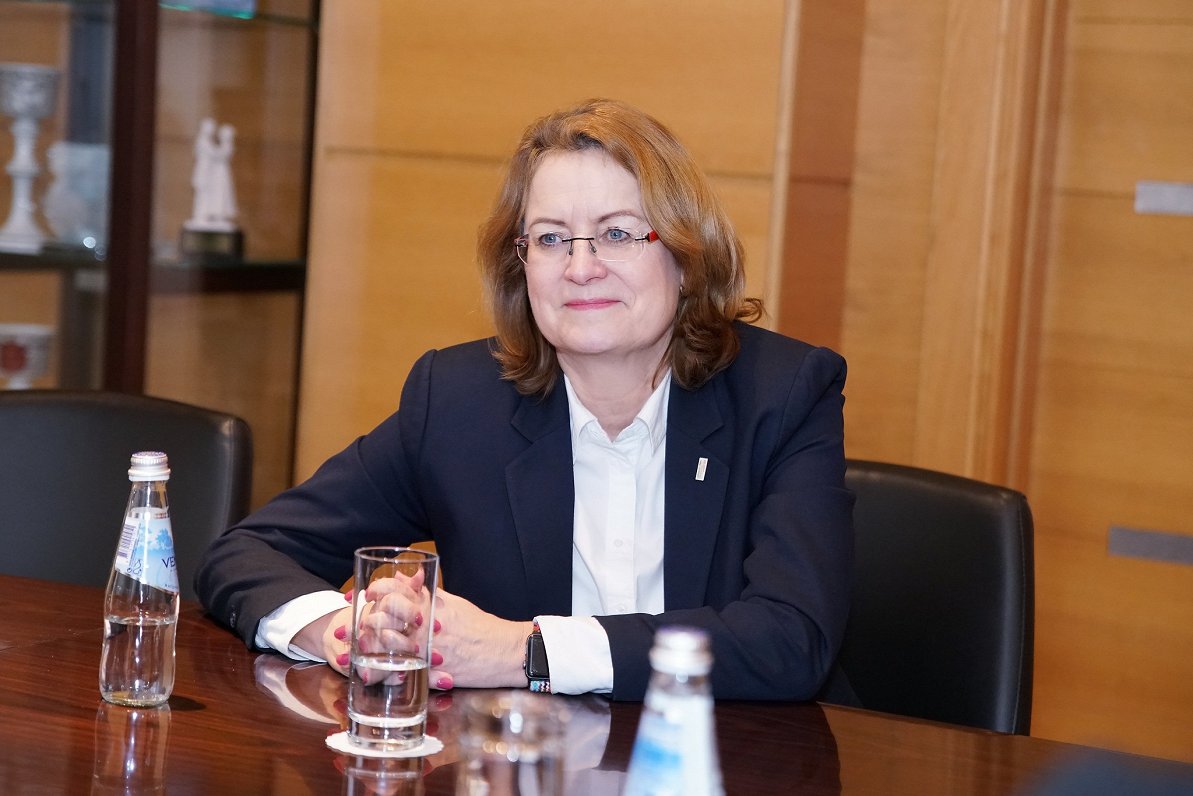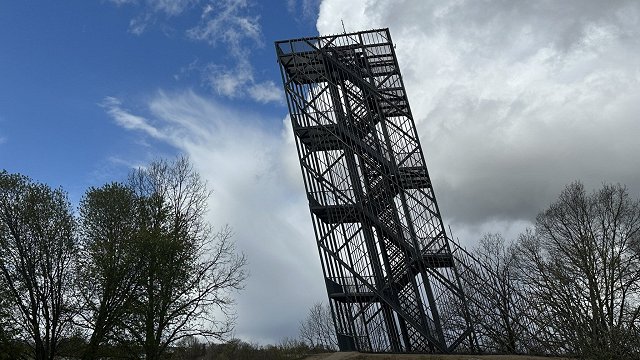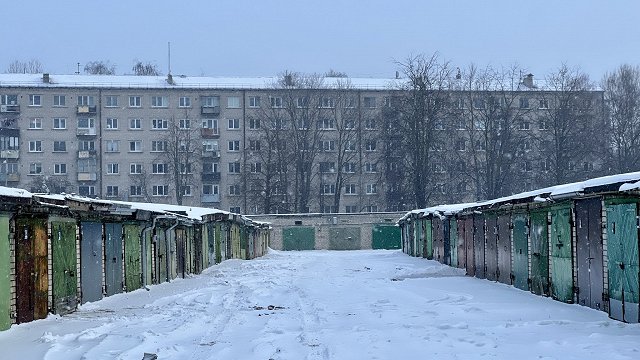Rīga rarely fails to impress visitors with its old town and most distinctive landmarks. This especially true for guests from Bremen who are often stunned and baffled since in many corners in the Latvian capital they seem to keep running into their hometown time and time again. Especially in the Old Town, people from the Hanseatic city by the Weser in Northern Germany encounter many historical parallels and striking similarities as they wander through the narrow cobble-stoned streets around Dome Square and Town Hall Square.
This also happened to Antje Grotheer, the President of the Bremen Parliament (Bürgerschaft), who assumed office in June 2023 and recently came to Rīga to pay her inaugural visit to Bremen’s twin city. Both located on rivers and close to the sea, the two cities have maintained an official partnership since 1985 but the ties go back much further back in time.
“It’s a bit like coming into the neighbourhood,” Grotheer told LSM with a smile at the sidelines of her three-day visit to Rīga. “We recognize a lot of things that are very similar to Bremen. That is really something special”, she enthused and named as an example the Three Brothers buildings – the oldest medieval dwelling houses in Rīga. “The inner courtyard looks like the Schnoor in Bremen. These houses look exactly like there“, the German politician explained, referring to Bremen’s oldest district that is lined with little 15th and 16th century houses.
Other even more obvious landmarks that make visitors from Bremen feel at home in Riga include the sculpture of the world-famous Bremen Musicians or the venerable statue of the knight Roland that in both cities signifies the city's privileges to administer justice, as well as its independence, freedom and trading rights. Likewise, the coats of arms of both cities feature the keys to heaven and are attached to the facade of the House of Blackheads in Riga. The splendid building for centuries hosted the Brotherhood of Blackheads, before the members of this historical German trading association had to leave Riga due to their forced relocation to Germany in 1940 – and found their new home in the Schütting guildhall in Bremen.
Common past, common possibilities
The many similarities are no coincidence. Rīga and Bremen have a common history that spans several centuries, and the relationship between the two Hanseatic cities is basically as old as Riga itself. The Latvian capital was founded in 1201 by Albert von Buxhoeveden, a bishop from Bremen, who ten years later laid the foundation stone of the Riga Cathedral.
In the course of the subsequent Christianization of the region, German settlers and merchants followed suit and established trade connections. In 1282 Riga became a member of the Hanseatic League and built strong ties with Bremen, which was one of the major hubs for the band of traders roaming the waters of Northern Europe back in medieval times. This even led to a Bremen consulate being set up in Rīga in 1827 for forty years.
The closely entwined history also left other traces – not just in the cityscape. “The Hanseatic cities are distinguished by the fact that they have always traded with a wide variety of populations, with a wide variety of people from a wide variety of countries. It always means certain cosmopolitanism. In Rīga you absolutely notice this too. The past has had a big impact on the city“, Grotheer said, adding that this common past also offers "common possibilities“ for more cooperation between the two cities.
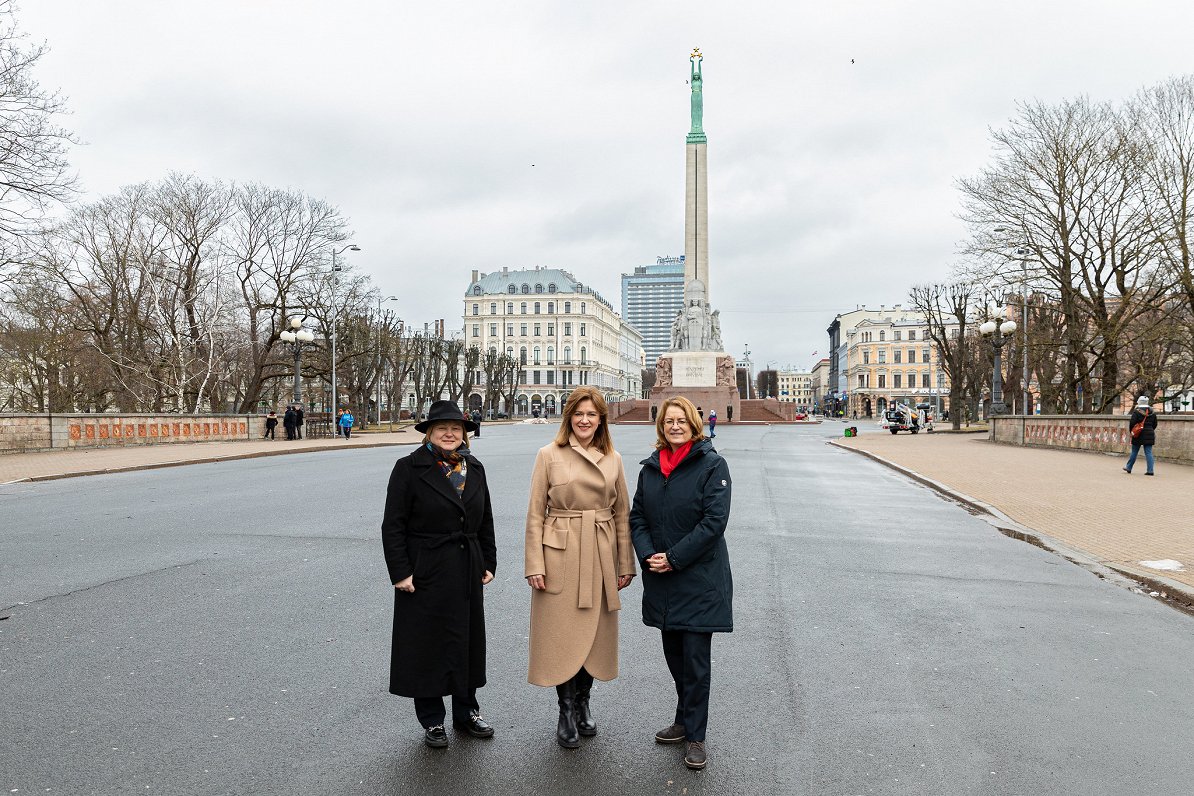
“We received an incredibly friendly welcome and the relationship between the Hanseatic cities is something special. The long-standing connections that we have here have opened many doors for us and led to many interesting conversations. And of course to the question of how can we actually do more things together,“ she told LSM.
Grotheer heads the parliament of Bremen, the smallest of Germany's 16 federal states by area and by population. The "State of Two Cities" is made up of the two geographically separate cities of Bremen itself and Bremerhaven. During her visit she held political talks both in the Rīga City Council and the Latvian Parliament about various topics ranging from gender equality and women's empowerment to youth participation in democratic processes and environmental issues. High on the agenda was also more economic cooperation and promoting of start-ups as well as urban planning and city development.
Main talking point: Ukraine
However, the dominant topic of the talks was the Russian war in Ukraine. “We had very few conversations where the situation in Ukraine and the proximity to Ukraine did not inevitably come up at some point. I found that very moving,” she said, adding that almost everything was discussed from a security perspective by her Latvian counterparts. “No matter what topic you are actually talking about, it is somehow always in the background.“
Grotheer also had very positive words for the great support in Latvia for Ukraine.
“I am incredibly impressed by what I have seen here, the commitment of the people, especially when it comes to Ukraine. This is clearly noticeable,” she told LSM, referring to the many blue and yellow Ukrainian flags that can be seen everywhere in city. “You notice very clearly that it is much closer and much more present here than at us.” She says she was particularly moved by an aid project of Riga Children's Hospital Foundation for traumatized children from Ukraine.
“We are trying to take a little something with us from each area that we have seen and simply reflect it back into politics or into the nearby areas. Maybe there are similar projects in our country where we can sit down together and think about whether we can benefit from each other’s experiences,“ Grotheer said, indicating that she will take a lot of ideas with her back to Bremen.
"That is the special thing about a town twinning partnership, that you try to do more with each other than with other cities, and that you benefit directly from having such friendly connections.“
Twin city anniversary in 2025
Riga has been a twin city of Bremen since 1985 – when Latvia was still under Soviet occupation. "Guided by the desire to deepen the friendly relations between the cities of Rīga and Bremen and to make a contribution to the cause of peace," reads the preamble to the framework agreement signed in Rīga on 18 February 1985 by the representatives of the Rīga City Soviet of People's Deputies and the Bremen Municipality. Concluded primarily for the motivation of reconciliation and solidarity between the peoples of the East and the West during the Cold War, the partnership agreement was later succeeded by an amended version after Latvia regained independence, which was signed in Bremen on 22 April 1992.
Cooperation between the cities has been maintained up to this day, and despite some ups and downs, can be considered long-term and firm. "I am absolutely sure that we will celebrate the anniversary in a very special way“, Grotheer said, adding that she is looking forward to next year’s 40th anniversary of the signing of the twinning agreement. "The organisation and preparation will be of course more within the town hall than the parliament, but I am quite sure that we all will achieve great things together.“
Asked whether the anniversary might led also to a reintroduction of a direct flight connection between both cities that was discontinued several years ago, Grotheer was unable to tell. “I do not know about current plans“, she said, adding that from her point of view one or two special anniversary flights would be "nice“, but that this decision is for the private sector to make. ”It would require that there is also a corresponding number of guests who want to fly from one city to the other but I cannot make any assessment on this.”
Rail Baltica and Rīga
Much clearer was Grotheer's view about another mobility project. “I think it is a great project“, she said about the pan-Baltic high-speed rail link Rail Baltica that is about to bring together the rail networks of the Baltic States and Western Europe. “It may be highly controversial, but observing from the outside how it is about connecting cities in a more ecological way than flying – I find that very impressive.“
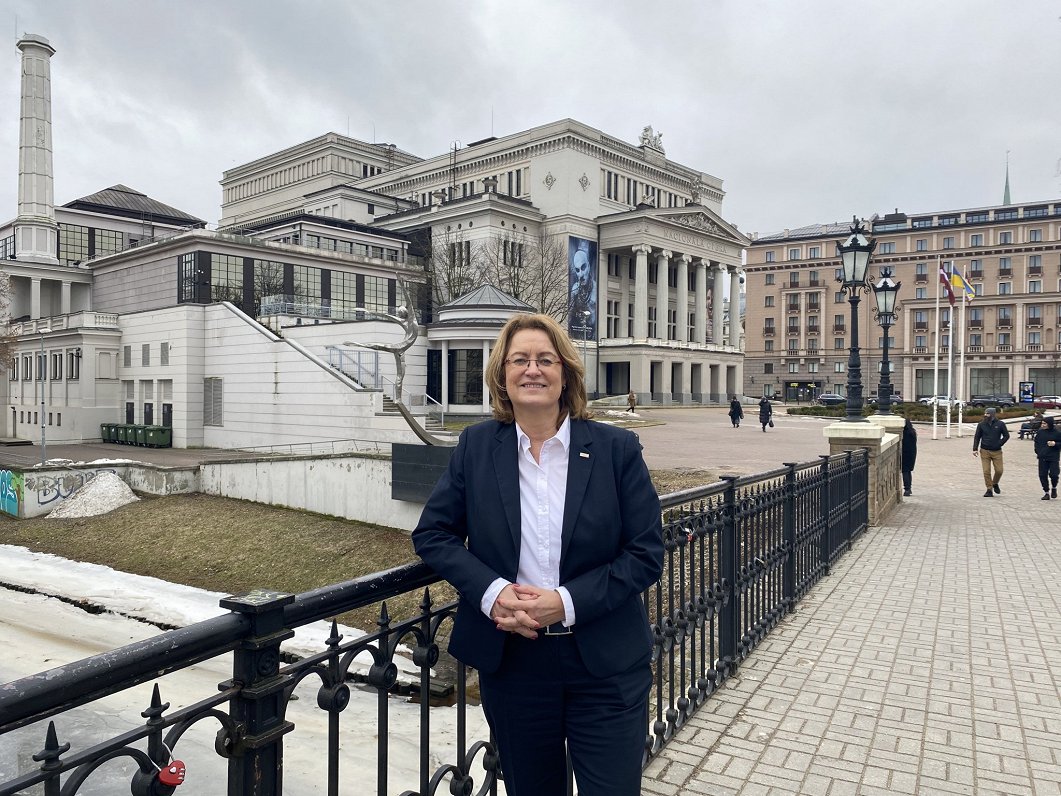
The original plan predicted that Rail Baltica would be completed in 2026, but current estimates are that the project will possibly be ready in 2030. “I firmly assume that not everyone is in favor of it because it is always the case when projects of such scale are planned. But it is very prominent and it shows how intensively Rīga is dealing with his role as a hub here in the Baltics”, Grotheer said. “It is very exciting to see how it takes on this role in this regard.”
Creating a new landmark in the city, the Rail Baltica Central Hub will see parts of Rīga's center refitted for the new railway. Its central element will be the Central Station building with a long-span steel structure and repetitive sequences of arches that are already now “very noticeable”, according to Grotheer. Once it is finished, it will also change the cityscape of Riga, providing something that not even visitors from Bremen will recognize.
